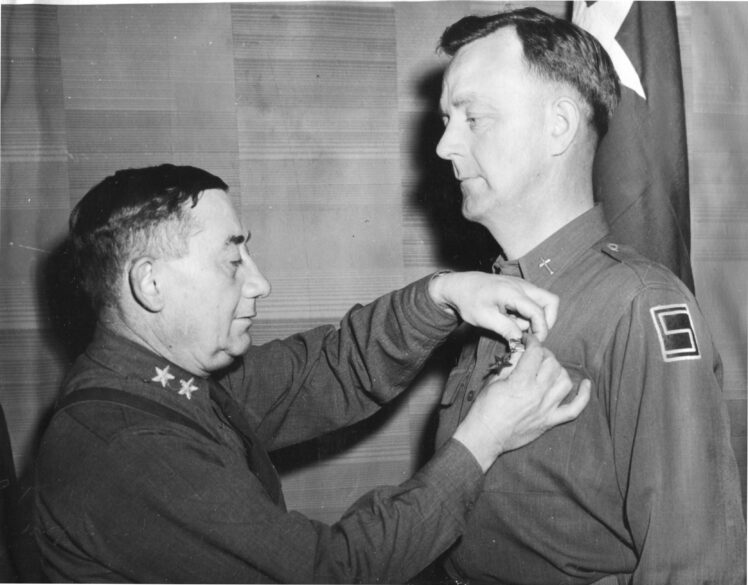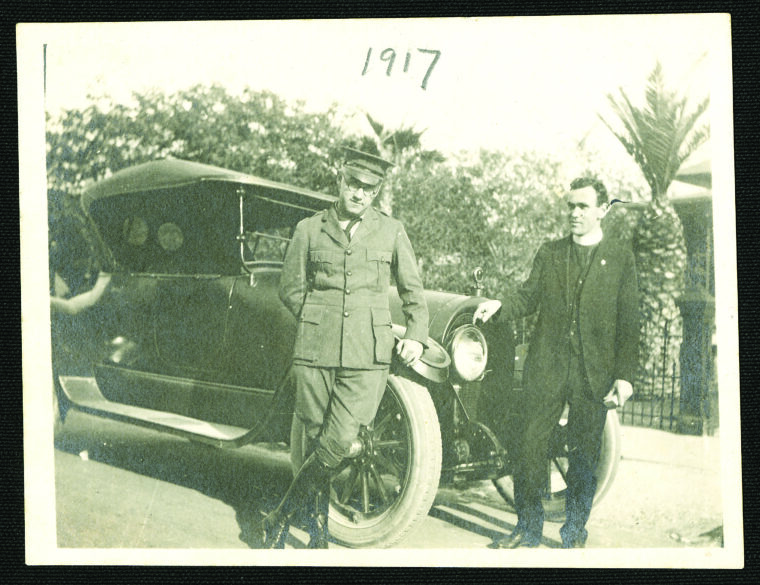From the Archives
By Mary Woodward
JACKSON – This article is a follow up to last issues focus on the Pearl Harbor anniversary and Bishop Gerow’s diary accounts of the POW camp in Panola County near Como. The subject of prisoner of war camps at Christmas is a little bizarre, but perhaps it is fitting to show how kindness and compassion can be central in the midst of a terrible time.
Throughout the history of our diocese, our clergy and religious have served as chaplains and angels of mercy to those on battlefields at home and abroad. Women Religious nursed Union and Confederate soldiers during the Civil War. Father Ghislain Boheme, founding pastor of St. Michael in Paulding, accompanied a group of men from the little town as they marched with Stonewall Jackson. Boheme succumbed to the harsh conditions and died on the side of the path in Virginia.

Father Hubert Spengler signed up for service in World War I, but fortunately he spent minimal time in the war to end all wars. Father Peter Quinn served as a chaplain in the European Theater in WWII. He received several battlefield citations for his pastoral heroism on and near the front lines in Germany.
Back home, the State of Mississippi became a housing site for Italian and German prisoners. The first of these came from the campaign in North Africa. Initially there were four main camps that housed several thousand POWs – Camp Shelby near Hattiesburg, Camp Clinton, Camp McCain near Grenada, and Camp Como mentioned above. Several smaller satellite camps and work details spawned from these. The Mississippi Department of Archives and History has loads of information on these camps.
From his 2001 article in Mississippi History Now entitled “German Prisoners of War in Mississippi, 1943-1946,” John Ray Skates describes the four camps in this way:
“Other major POW camps in Mississippi were established at Camp McCain near Grenada, Camp Como in the northern Delta, and Camp Shelby near Hattiesburg. The four base camps were large compounds designed to house large numbers of POWs. Camp McCain housed 7,700; Camp Clinton 3,400; and Camp Shelby housed 5,300. Camp Como originally held 3,800 Italian soldiers, but the Italians were soon moved out of Mississippi and replaced by a smaller number of Germans.”
In the previous column, the quotes from Bishop Gerow’s diary detailed his visit to Camp Como in 1943 to check on the Italian POWs. Bishop Gerow, who studied in Rome, would have been able to converse with the Italians. Among the POWs were not only officers and soldiers, but also four Italian Catholic priest chaplains.

The presence of so many Italian POWs caught the attention of the Holy See and Bishop Gerow received a letter from the Apostolic Delegate inquiring about the conditions of the camp. In a letter dated June 11, 1943, the Apostolic Delegate instructs Bishop Gerow to “see that these men have adequate religious ministration and whatever little comforts it may be possible to give them; and if the camp commander permits, that they be supplied with a radio phonograph, which the Apostolic Delegate will pay for and present in the name of the Holy Father.”
Bishop Gerow replied in a letter dated June 19, that Father Cletus Manon, who was based in Water Valley, has visited the camp and found the four chaplains among the prisoners. Father Manon supplied them with altar stones, vestments, wine and hosts, candles and all that was necessary for Mass.
In the fall of 1943, Father Emile Rotondo, a native Italian and pastor in Cleveland, began ministering to the POWs from Como who were being used to work in the fields in the Delta. On Oct. 4, Bishop Gerow wrote the Delegate asking for permission for Father Rotondo to celebrate three Masses so he might give “proper attention to the Italian prisoners of war at Camp Como who are now in Father Rotondo’s territory picking cotton.”
The Delegate replies in a letter dated Nov. 3, granting permission. He adds he is sending prayer books, holy cards, etc., for the prisoners and asks Bishop Gerow to get two radios for the POWs once again in the name of the Holy Father.
Not long after these letters were exchanged the Italian POWs were transferred out of Mississippi and the camps were used strictly to house Germans. Pastoral care did continue, but the unique Italian connection between Pope, Apostolic Delegate, Delta pastor and prisoners was lost.
Writing about POWs and war at Christmas seems quite odd – war with all its brutality and lack of humanity. In quoting these letters and diary accounts, I have tried to reflect how our local diocesan church responded to a unique situation during the violence of world war.
O Come, O Come Emmanuel… Let us pray for peace!
(Mary Woodward is Chancellor and Archivist for the Diocese of Jackson.)
